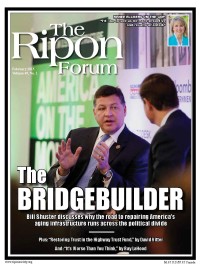The Highway Trust Fund is falling apart. Congress has bailed it out with over $70 billion since 2008 because spending is consistently exceeding revenues. Looking forward, spending plans are 30 percent higher than expected revenues for the highway account and are 50 percent higher for the mass transit account.
This is not because of massive increases in federal transportation needs. Rather, federal funds are bailing out state highway departments and local transit systems. The notion of Congress raising the fuel tax is very popular with state highway departments, local transit systems and transportation building contractors, but even with lower fuel prices, it is not popular with citizens. Among other reasons, this is likely because citizens can see the Highway Trust Fund needs fixing before it receives more money.
Let’s start with bailing out the states. The federal fuel tax was created to build the Interstates, but now is mostly an inefficient pass-through to state programs and projects that have little or no national purpose. If federal transportation dollars were focused on functions that are truly federal in nature, primarily maintaining and improving the Interstate system, current revenues would be adequate for now. States would have to follow the principles of federalism and find their own revenues for state and local transportation needs. The same holds true for local transit systems, the benefits of which are almost limited to the immediate area.
The federal fuel tax was created to build the Interstates, but now is mostly an inefficient pass-through to state programs and projects that have little or no national purpose.
At the same time, we needn’t accept that the first thing to do is spend more money. Rather, start with getting more bang for the bucks already being spent. The federal highway program places little emphasis on this. Indeed Texas, Maryland, Rhode Island, Connecticut, New Jersey and the District of Columbia spend less than half of their state fuel taxes on transportation, and many other states spend substantial portions on non-transportation items. Nor does the federal highway program do a good job of driving funding to the most valuable and high-performing projects, or emphasizing use of public-private partnerships to leverage public funds with private investments, which would make the most use of the dollars it has.
Replacing the decreasingly viable fuel tax with a mileage-based fee will help protect transportation revenues from politicized decisions and tie them to use.
But these factors pale in comparison to the simple, inexorable trend in the United States of using less gasoline and diesel per mile we drive — meaning we are using the roads more, but paying less tax to do so. That puts rising demand on highway systems and agency budgets while their revenues decline every time the average fuel economy of vehicles improves.
Lower fuel prices may slow this trend as people go back to SUVs and just plain drive more. But the simple fact is, everyone wants to use less fuel if they can, and we have many, many policies to encourage doing so, which makes basing our funding of transportation infrastructure on taxing fuel ever more tenuous. We need to be looking at the long run and how we can replace the fuel tax with a direct user fee. The most effective user fee will charge drivers by the mile, since that is the actual unit of road being consumed. To that end, the Federal Highways should be working with states to do trials and figure out if and how a mileage-based user fee could work.
Oregon, Nevada, and Minnesota have already tested mileage-based user fee systems, with Oregon taking the furthest steps to permanently replace gas taxes with road user charges for some drivers, and California is starting a pilot project later this year. Ideally, a functional system for a mileage-based user fee will be developed at the state level and the federal government will cooperate to evolve that system nationwide. A top-down, federally driven approach would almost certainly be too heavy handed, politicized and slow to adapt to changing technologies.
During trials of mileage-based user fees, federal and state partnerships need to answer a series of questions and deal with a number of issues, including, but not limited to:
• Charging by the mile while protecting people’s privacy. There must be policies governing any data gathered and its uses with enforcement, oversight and transparency.
• Giving drivers choices on how their mileage is calculated and the fee is determined. Some people will want an entirely private non-technology option like paying a flat fee or periodic odometer reading. Other choices should allow the vehicle owner to control the data that is gathered by more high-tech means as well as the transmission of data to fee collectors. Others can choose more active and less private options like GPS or cellular systems.
• Determining what amount of fee should be used and how to adjust it when needed. A mileage-based fee will be unacceptable to most people if it is an added tax. It has to replace the fuel tax and be set to accomplish that fairly and transparently. If that is done, the new fee will stop the shrinking of revenues and ensure that revenue will be linked to people’s use of the systems it pays for.
• Exploring ways to reduce the costs of collecting mileage-based fees. Right now it is more expensive to collect than fuel taxes, and those costs need to be brought down to acceptable levels, which should be possible with sufficient scale and the falling cost of the technology.
Our transportation system is crucial to our economy. Replacing the decreasingly viable fuel tax with a mileage-based fee will help protect transportation revenues from politicized decisions and tie the revenues to actual road use. A more stable and economically efficient way of funding transportation will be better for users and the agencies who manage the infrastructure.
Dr. Adrian Moore is Vice President of Policy at the Reason Foundation.





